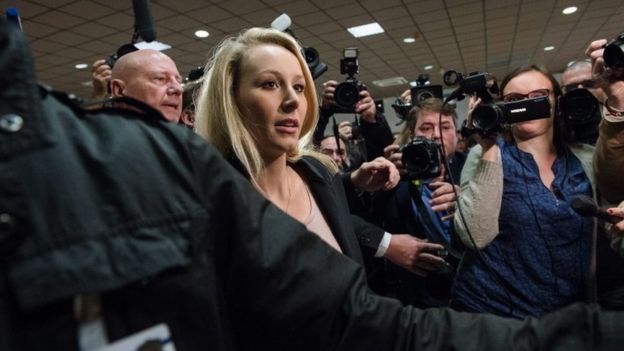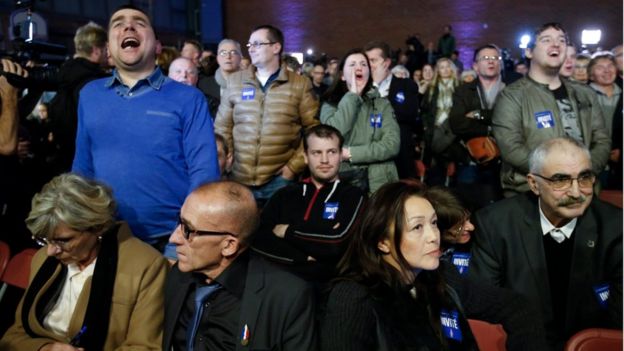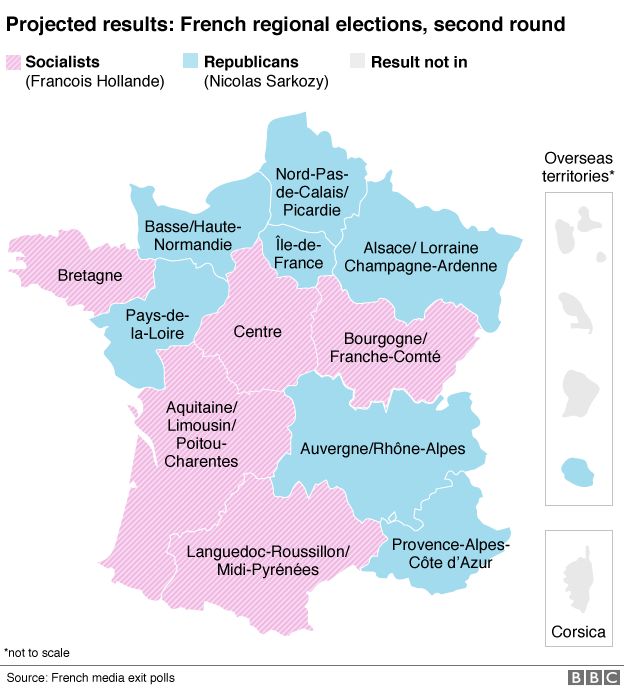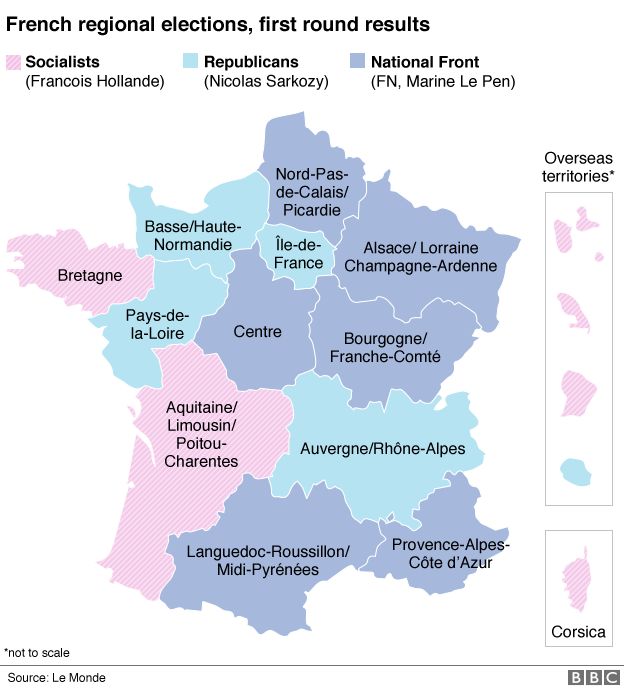- 30 minutes ago
- From the section Europe
France's far-right National Front (FN) has failed to win a single region in the second round of municipal elections, vote projections indicate.
Exit polls and early results suggest the party has been beaten into third place, despite leading in six of 13 regions in the first round of voting.The polls predict Nicolas Sarkozy's centre-right Republicans will win most seats ahead of the ruling Socialists.
Acknowledging defeat, FN leader Marine Le Pen pledged to keep fighting.
And she blamed the outcome on the mainstream parties which joined forces to keep the FN from power, telling her supporters they had been "disenfranchised in the most indecent of ways by a campaign of lies and disinformation".
The far right's charm offensive
After both led with more than 40% of the vote in the first round on 6 November, the Socialist candidates in those regions pulled out so their voters could support Republican candidates against the FN in the second round.
Early estimates suggest Marine Le Pen secured about 42% of the vote in the second round in her region, against the centre-right's 58%.
Marion Marechal-Le Pen took about 46%, compared with 54% for her Republican rival.
Despite the defeat, the 26-year-old urged FN supporters to "redouble our efforts".
"There are some victories that shame the winners," she said.

Analysis: BBC's Hugh Schofield in Paris
There can be no hiding that the results of the elections are a big personal blow to Marine Le Pen.She has lost the chance to govern a region and show the world that her party is serious. She has been reminded that however strongly the FN performs, the gates of power remain tightly closed.
But in a way that suits her fine.
Because what it all means is that nothing in France has changed. The two main parties continue sharing out the goodies (in this case deliberately conniving to keep hers as well).
Meanwhile unemployment rises; terror stalks; the grim insurrectionary mood continues to spread.
Marine's prospects for power may be limited, but her appeal is as strong as ever for France's growing numbers of disgruntled and disaffected.
That French "ouf" of relief? It's also the noise you make when you get a fist in the abdomen.
Read more from Hugh

But Socialist Prime Minister Manuel Valls was less upbeat. He warned the "danger posed by the far right has not gone away, far from it".
And Mr Sarkozy said now was the time "for in-depth debates about what worries the French", noting security concerns, unemployment and frustration with the European Union.
 Image copyright EPA
Image copyright EPA  Image copyright EPA
Image copyright EPA French media are predicting that the Republicans have taken seven regions and the Socialists five, with nationalists winning Corsica. Official results are expected early on Monday.
One of the biggest upsets happened in the Paris region, Ile-de-France, which shifted from the Socialists to the Republicans for the first time in nearly 20 years.
The first round of voting on 6 December gave the FN the best election results in its history.
In the lead-up to the first round, opinion polls suggested that the popularity of the anti-immigration, anti-EU FN had increased since the deadly attacks.
The FN had been hoping a strong performance would boost Marine Le Pen's chances in the 2017 presidential election.


Did you vote in the elections? What is your reaction to the exit polls? You can share your comments by emailing haveyoursay@bbc.co.uk.
Please include a contact number if you are willing to speak to a BBC journalist. You can also contact us in the following ways:
- WhatsApp: +44 7525 900971
- Send pictures/video to yourpics@bbc.co.uk
- Upload your pictures / video here
- Tweet: @BBC_HaveYourSay
- Send an SMS or MMS to +44 7624 800 100
Or use the form below

No comments:
Post a Comment